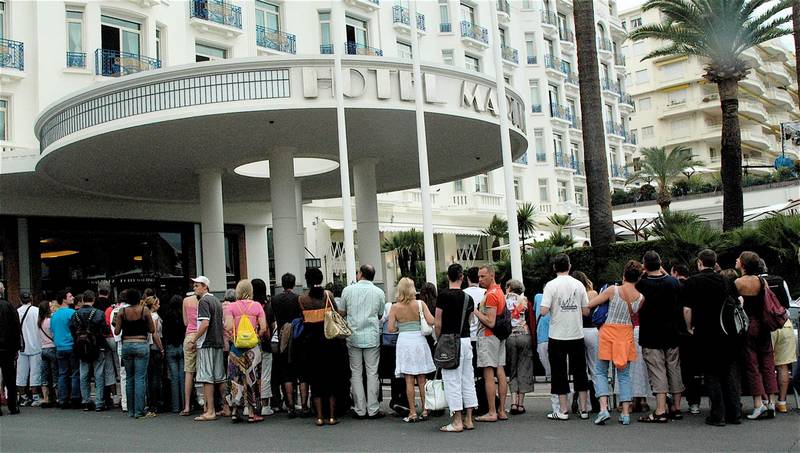CANNES, France – At last, on Day 9 of the Cannes Film Festival, an old-fashioned real movie, with a beginning, middle and end, characters, a story, and a powerful message. Is Rachid Bouchareb’s “Days of Glory” (“Indigenes”), a drama about French troops from the colonies of Northern Africa, too traditional to win the Palme d’Or?
The film begins as poor Algerians and Moroccans volunteer to join the Free French army and defend the “homeland” none of them have ever seen. It follows them through one battle after another, through the burning sands of Morocco and the freezing winters of northern Italy, to a lonely outpost in a French village where their heroism is dearly paid for.
All the time, they are promised they will be “remembered,” but a French censor blocks all correspondence with the French girls they have met, a French Algerian officer argues their case but is essentially racist, and they are giving their lives for a “homeland” that wants them to return as quickly as possible to the Muslim nations of their birth. The human stories of the individual soldiers become enormously important to us.
After the screening, we journalists gathered as always in the area where our mailboxes hold daily piles of press releases. There was a kind of amazement in the air. We included Tony Scott of the New York Times, Lisa Schwarzbaum of Entertainment Weekly, Ken Turan of the Los Angeles Times, and Michel Ciment, the best-known French film critic. We were all smiling at having seen a “real movie” –- remembering the pleasures of traditional craft and storytelling.
“It is the kind of movie the French have forgotten how to make,” said Ciment. “We can make art films and silly sex comedies, but this is what I call a Saturday night movie for real moviegoers. Not great art, but great moviemaking.”
High praise, but higher still came from Ken Turan: “I stayed right until the end.” This statement has to be put in context. Turan’s long-standing policy at all film festivals is to see the beginnings of as many films as possible, perhaps eight or ten a day. “I want to get an overview of the whole festival,” he explains. He’ll see the complete film in Los Angeles when it opens. All the publicists know “it doesn’t mean anything bad when Kenny leaves after 30 minutes.”
“You are still here!” I said.
“I really got wrapped up in it,” he said.
“I can see the ads now,” I said. “Four stars – Ebert! I stayed right until the end! – Turan.”
* * *
As you’re reading this, do you have the impression that Sofia Coppola’s “Marie Antoinette” was booed here at Cannes? You can be excused for that impression, because the booing at the Wednesday morning press screening was widely reported, and I am one of those responsible, although I did not boo. Drudge headlined the boos and linked to a story in Variety saying they had “a Gallic accent,” leading to my speculations yesterday about whether “boo” sounds differently in French and English.
But now let’s step back and be fair. Yes, there was booing. But I was present at the screening and would guess not more than five people, maybe 10, booed. Many others applauded. Booing is always shocking to North American critics; I am not sure I have heard booing more than once or twice in all my years at the Toronto, Sundance, Telluride, Chicago, Montreal or New York festivals. In Europe, they boo all the time, sometimes because they think a film is bad, sometimes because it is (according to them) politically incorrect.
The reports of booing have disturbed Coppola, who on a few hours’ notice unexpectedly withdrew as the guest of honor for festival president Gilles Jacob’s formal dinner Thursday night at the Carlton Hotel.
“I don’t know why Variety thought the French were booing,” Pierre Rissient told me the next morning in the sunny breakfast room of the Hotel Splendid. Rissient is one of the best-connected people in the world of French cinema; he represents one degree of separation.
“The French critics saw the film in Paris before it played here. The reviews were mostly very good. It opened in Paris yesterday and is doing terrific business. The only thing we might question is the implication that Louis XVI was not the father of all of Marie Antoinette’s children. DNA testing has shown all her descendants were Bourbons.”
More evidence that the boos did not have a Gallic accent comes from Dave McCoy, who writes at MSN Movies:
“At one point, Marie, just awakened by a swarm of servants, stands naked and cold, while family members decide who gets the privilege of dressing her. Until this point, Marie has said little in the film. When finally clothed, she utters, ‘This is ridiculous.’ ‘This is Versailles,’ responds her servant.
“I laughed, as I had been doing for the past 20 minutes. I was laughing at the satire, at Coppola’s brash approach and from the pure joy that a great film can trigger. That’s when two French journalists to my right Frenched me. “Those were the rules! They had rules!’ one hissed, while the other sneered and added, ‘Not funny! Not funny!’ Of course, this made me laugh harder. I briefly considered explaining the concept of satire to my hosts, but it was pointless.”
So did those who boo perhaps have a Yankee accent? Or British, Italian, or Austrian? Who can say? The important point is that the film was not hated. The daily “critics’ jury” of Screen International, a cross-section of nine international critics, gave it 2.44 points out of a possible 4; it’s tied for fifth out of 14 films. In another poll, Michel Ciment rated it worthy of the Palme d’Or. In Le Film Francais, the French trade paper, five of the 15 critics gave it their highest rating — “worthy of the Palme d’Or.”
I’ve also noticed that opinions on the film seem to be growing more favorable as time passes. True, many viewers were disappointed that it doesn’t end with Marie’s beheading. On second thought, I realize Coppola was making a film about a performance: A 14-year-old girl from Vienna is brought to France to cement a diplomatic alliance and symbolize the bonds between the nations. Versailles is a stage upon which she plays a queen. She has her own theatrical ambitions, and her husband even builds her a theater where she can sing.
Then the revolutionary mob assails Versailles, and as she appears on a balcony, she majestically lowers her head, spreads her arms, and bows to them. Finally, a real curtain call. Perhaps a beheading would have been anticlimactic.












